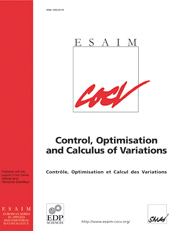Crossref Citations
This article has been cited by the following publications. This list is generated based on data provided by
Crossref.
Pakniyat, Ali
and
Caines, Peter E.
2013.
The Hybrid Minimum Principle in the presence of switching costs.
p.
3831.
Rao, Z.
Siconolfi, A.
and
Zidani, H.
2014.
Transmission conditions on interfaces for Hamilton–Jacobi–Bellman equations.
Journal of Differential Equations,
Vol. 257,
Issue. 11,
p.
3978.
Granato, G.
and
Zidani, H.
2014.
Level-Set Approach for Reachability Analysis of Hybrid Systems under Lag Constraints.
SIAM Journal on Control and Optimization,
Vol. 52,
Issue. 1,
p.
606.
Pakniyat, Ali
and
Caines, Peter E.
2014.
On the relation between the Minimum Principle and Dynamic Programming for Hybrid systems.
p.
19.
Pakniyat, Ali
and
Caines, Peter E.
2014.
On the Minimum Principle and Dynamic Programming for Hybrid Systems.
IFAC Proceedings Volumes,
Vol. 47,
Issue. 3,
p.
9629.
Pakniyat, Ali
and
Caines, Peter E.
2015.
On the minimum principle and dynamic programming for hybrid systems with low dimensional switching manifolds.
p.
2567.
Ferretti, Roberto
and
Zidani, Hasnaa
2015.
Monotone Numerical Schemes and Feedback Construction for Hybrid Control Systems.
Journal of Optimization Theory and Applications,
Vol. 165,
Issue. 2,
p.
507.
Pakniyat, Ali
and
Caines, Peter E.
2015.
On the Relation between the Hybrid Minimum Principle and Hybrid Dynamic Programming: a Linear Quadratic Example.
IFAC-PapersOnLine,
Vol. 48,
Issue. 27,
p.
169.
Sheetal, Dharmatti
2016.
Viscosity Solutions of Hybrid Game Problems with Unbounded Cost Functionals.
International Game Theory Review,
Vol. 18,
Issue. 01,
p.
1550016.
Pakniyat, Ali
and
Caines, Peter E.
2017.
On the Relation Between the Minimum Principle and Dynamic Programming for Classical and Hybrid Control Systems.
IEEE Transactions on Automatic Control,
Vol. 62,
Issue. 9,
p.
4347.
Pakniyat, Ali
and
Caines, Peter E.
2017.
A Class of Linear Quadratic Gaussian Hybrid Optimal Control Problems with Realization–Independent Riccati Equations.
IFAC-PapersOnLine,
Vol. 50,
Issue. 1,
p.
2205.
Pakniyat, Ali
and
Caines, Peter E.
2017.
Hybrid optimal control of an electric vehicle with a dual-planetary transmission.
Nonlinear Analysis: Hybrid Systems,
Vol. 25,
Issue. ,
p.
263.
Cowlagi, Raghvendra V.
2017.
Hierarchical trajectory optimization for a class of hybrid dynamical systems.
Automatica,
Vol. 77,
Issue. ,
p.
112.
Goebel, Rafal
2019.
Existence of optimal controls on hybrid time domains.
Nonlinear Analysis: Hybrid Systems,
Vol. 31,
Issue. ,
p.
153.
Poveda, Jorge I.
and
Teel, Andrew R.
2021.
Handbook of Reinforcement Learning and Control.
Vol. 325,
Issue. ,
p.
727.
Pakniyat, Ali
and
Caines, Peter E.
2021.
On the Hybrid Minimum Principle: The Hamiltonian and Adjoint Boundary Conditions.
IEEE Transactions on Automatic Control,
Vol. 66,
Issue. 3,
p.
1246.
El Asri, Brahim
and
Lalioui, Hafid
2023.
Deterministic differential games in infinite horizon involving continuous and impulse controls.
Journal of Control and Decision,
p.
1.
Yang, Mengna
Zhao, Junfeng
Zhang, Haolun
and
Nie, Yufeng
2024.
Hölder estimates for viscosity solutions of nonlocal equations with variable-order fractional Laplace term.
Journal of Mathematical Analysis and Applications,
Vol. 538,
Issue. 2,
p.
128453.
Dharmatti, Sheetal
and
Krishnan, Nandakishor
2024.
Mathematical modelling and optimal control analysis of pandemic dynamics as a hybrid system.
European Journal of Control,
Vol. 75,
Issue. ,
p.
100942.
Pakniyat, Ali
and
Caines, Peter E.
2024.
The minimum principle of hybrid optimal control theory.
Mathematics of Control, Signals, and Systems,
Vol. 36,
Issue. 1,
p.
21.


